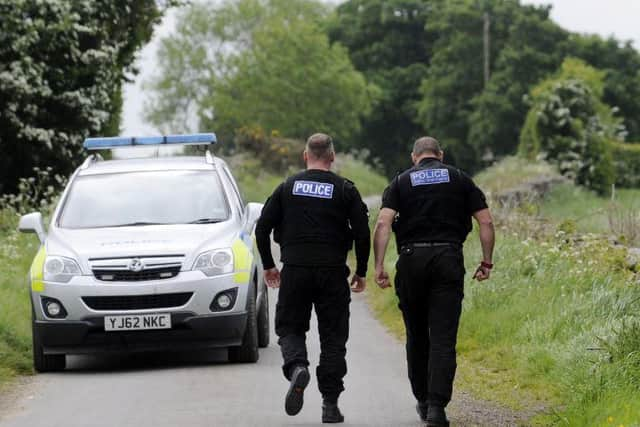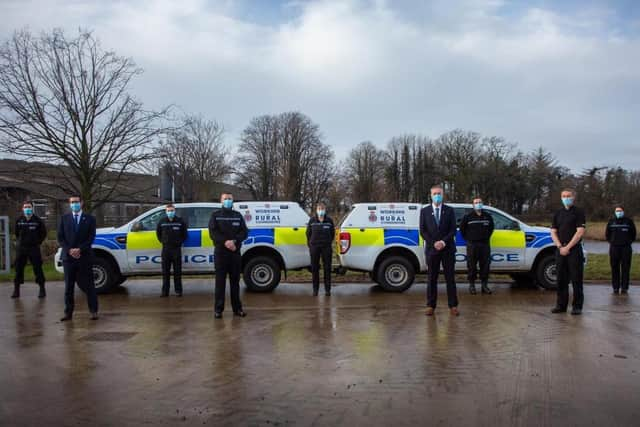Lancashire police announce crackdown on rural crime with new task force
and live on Freeview channel 276
A 20-strong team of rural task force officers have begun cracking down on issues that affect rural communities in Lancashire the most, in a bid to increase community confidence and reduce crime.
Funded through the police officer uplift programme, the teams formed part of the local policing teams covering rural communities from March 1, to tackle prominent issues include drug dealing, road safety and antisocial and nuisance behaviour.
Advertisement
Hide AdAdvertisement
Hide AdAnd they will be working with the communities to target other aspects of rural crime including the poaching of protected species and the theft of machinery, plants and expensive livestock from farms.
The news comes as the Post reported that two baby goats were snatched from a Lancashire farm last month.
And on Monday, they revealed night vision cameras were used to detain three suspects who were potentially involved with vehicle theft, domestic violence and suspicious activity on a Morecambe farm.
Chief Supt Sam Mackenzie of Lancashire Constabulary said the need for a crackdown on rural crime is because criminals think there is a lesser chance of them being caught.
Advertisement
Hide AdAdvertisement
Hide AdHe said: "The introduction of the new, dedicated rural taskforce teams is great news and puts extra resources in our rural communities. They will assist in tackling local priorities, organised crime and travelling criminality.


"This is an opportunity for people to tell us what matters to them where they live so that we can better target our activity. Part of our job is to go out into these communities and focus our activities on issues they encounter.
"Theft of livestock and machinery is an issue that really has a significant impact on farmers, especially those with particularly high-value stock. Wildlife crime covers a range of activities such as the targeting of protected species which form part of our heritage in Lancashire, dogs being used for hunting, the poaching of deer and river poaching.
"All these activities going on in Lancashire and the task force will give us a more direct approach to tackling them."
Advertisement
Hide AdAdvertisement
Hide AdHe revealed that with 74 per cent of Lancashire being formed of rural land, the officers will be a 'great asset' in preventing crime and supporting the rural communities that have diverse needs.


The launch follows the investment in 40 task force officers located in the county’s towns and cities last year.
And the teams will continue to tackle crime committed by criminals who travel from towns and cities further afield, including the work of organised criminal gangs who deliberately target agricultural machinery and livestock.
Sam added: “Last year we established taskforces in our more urban areas and they have been effective in targeting those issues and people who cause the most harm to our communities. This brings that model out to our rural areas.
Advertisement
Hide AdAdvertisement
Hide Ad"We have seen that with austerity, a number of police services have not been at the level we would like them to be. This allows us to reinvest back into communities that have suffered significantly with the high volume of this sort of crime taking place in the county.
"The smaller population density and the wider area mean criminals think there is a lesser chance of getting caught. We need these communities to express their concerns and communicate directly with us to help us locate and respond to such crimes.
“Talking to the residents in rural areas is key to the success of these teams. We will be asking our communities to tell us what their issues and concerns are so we can actively work to address them.
"We have already started seeing that this makes a difference to the community, especially since the Lancashire Talking model was introduced last year. The small teams are very much focused on the area and issues they are dealing with."
Advertisement
Hide AdAdvertisement
Hide AdThe Lancashire Talking programme asks a few online questions about what it’s like to live in different areas and aims to find out what issues matter most to the community.
And Lancashire's Police and Crime Commissioner Clive Grunshaw is urging the government to introduce long-term funding to bring more officers back to the police force.
Clive Grunshaw, Lancashire's Police and Crime Commissioner, added: "Protecting our rural communities is as much a priority for me as it is policing our more urban towns and cities. They further support my commitment to making sure the public sees genuine improvements to local policing and increased officer numbers as we invest back into the force.
"We all want to see more officers out on our streets, tackling crime and supporting all our communities. That is why I continue to lobby the Government for fairer long-term funding that puts the officers we have lost since 2010 back into Lancashire, instead of still being hundreds of officers worse off whilst other areas benefit.
Advertisement
Hide AdAdvertisement
Hide Ad"These five teams are trained to help tackle the unique issues faced in more rural areas and build safer rural communities, by working closely with the people who live and work in them. The force has been rated as outstanding in terms of our efficient use of the resources we have so, residents can be confident we will continue to deliver the highest quality policing service possible."
Thanks for reading. If you value what we do and are able to support us, a digital subscription is just £1 per month for the first two months. Try us today by clicking here.